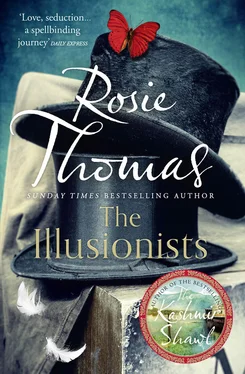Coope clapped his big hands. ‘Make them hungry, as you say, and whet their appetites further by filling the air with the scent of a fine roast.’
‘But folk will be disappointed when they get no pig at the end, wun’t they?’ someone muttered.
Coope looked over the rows of faces, many of them clearly familiar with what it felt like to be denied roast pork. He was a sympathetic man and he wished he had chosen his words and his example more adroitly, so he hurried on.
‘Here is an exercise for you.’
He had thought of setting them to the lettering of a handbill, but the young man with the unfortunate head of hair had accidentally come up with a more interesting proposition. So out of a moment’s embarrassment and otherwise acting on an impulse, Raleigh Coope began to tell them about the Palmyra theatre and the want of an audience for what he privately judged to be a music-hall turn. It was an audacious and well-executed turn, it was true, but it was mostly George Gardiner’s enthusiasm for it that had fired his own.
‘What might you do to bring in an audience, using a visual image, gentlemen?’
There was a long, baffled silence. Too audibly someone scratched his head. Then, slowly, the red-haired boy raised his hand.
‘Sir?’
Devil left the stew of alleyways and trudged out into Holborn. December’s bitter wind made him hunch his shoulders and clench his fists inside his tattered pockets. His belly rumbled with hunger and with the less easily assuaged pangs of general dissatisfaction. He was thoroughly tired of sharing his lodgings with an irritable dwarf of eccentric habits. Maria Hayes’s demands were intensifying according to the length of time that Carlo spent under her roof, and her husband had begun to glare at Devil with dull coals of suspicion in his eyes. Reaching a street corner, he hung there with his chest hollowed against the gusts as he tried to decide where to go. There must surely be a tavern nearby with a fire, and a landlord who would take his promise in exchange for a tot of brandy?
But no such place came immediately to mind so his steps tended southwards, towards the Palmyra.
In the distance in an angle of two walls, splashed over sooty brickwork, he saw a painted palm tree. The size of it – three feet tall, if it was an inch – and the insolent brightness of whitewash against the dingy background were what caught his attention in the first place. But then it came to him that its outline was entirely familiar because it was a crisp stencil-cut version of the palm that crowned the theatre pillars. The same palm motif had been taken as an ornament for the head of Jacko Grady’s playbills and posters and it also adorned the theatre’s programmes.
Devil splashed through the mud to examine it more closely.
The whitewash had been applied haphazardly through the outlines of a stencil held up against the wall. Trickles ran down from the curved leaves and dribbled from the base. It was clearly fresh. Devil ran his thumb over a section of the trunk and scraped the brick beneath. The whitewash was only just turning grey with wind-blown dust. He walked on and passed a dozen more palms. As he drew near to the Strand he noticed arrows in the same whitewash, painted over walls and lintels, on steps and on the stones underfoot, all of them pointing in the direction of the Palmyra. People hurried by, but Devil estimated that most of them bestowed at least a wondering glance on trees and arrows.
He reached the Strand. Here another much bigger arrow pointed from the street towards the theatre entrance. A ragged street sweeper prodded his broom at it.
When Carlo arrived for the matinée Devil asked him what he thought of this proliferation of palms. The dwarf shrugged.
‘Grady’s doing?’
Devil thought this was highly unlikely. ‘Grady? You mean, he’s had a selling notion and then paid to have this done? Or is there some third person involved? Someone we know nothing about?’
The dwarf shrugged again. He and Devil were constantly at odds, chafed by too much proximity and downcast after a run of poor houses.
‘Ask him, if you’re so interested.’ He swung away and took the philosopher’s wig out of its box. The horsehair was matted with grime from its excursions beneath the stage.
Devil never spoke to Jacko Grady unless it was impossible to avoid him. He undid his buttons and took off his shirt, ready to put on his costume. Next to him the soprano was preparing for the stage by gargling and spitting linctus into a tin bowl. From her other side Bascia darted Devil a thin, complicit smile of disgust.
The next day there were more palm trees, a white forest of them waving all across Covent Garden as far as Trafalgar Square. Devil saw a man stop walking, turn in his path and follow with his eyes the direction of an arrow. That night there was a somewhat bigger audience, and the atmosphere of expectation amongst the crowd raised the quality of the performance. There were some Rawlinson students present, and the Philosophers received by far the longest and loudest applause. Grady intercepted Devil and Carlo as they came offstage. His thumbs were tucked into the pockets of his grease-blotched waistcoat.
‘What is this, Wix?’
‘What is what?’
‘The trees.’
The bustle of the wings might not have existed. Prickling with antagonism the two men appraised each other. From the belligerence of his question Devil understood that Grady was concealing suspicious alarm, and so most probably was not behind the strange multiplying of whitewashed palms. This did not reassure him. It could only mean that some other individual threatened to intrude, one who might be more devious and therefore a more formidable rival than greedy Grady.
‘I have no idea,’ Devil blandly countered, hoping to convey that he did. ‘The question is – is it criticism or applause?’
Grady’s mind was working, but the labour did not bring forth any explanation or a reason to blame Boldoni and Wix. He contented himself with a generalised thrust. ‘You need to get up some new material. Use the rigmaroles from your audition. Cards, memory, vanishing. Your box trick will be stale by next month.’
‘I don’t believe it will, but to offer you some of our astonishing new tricks will be a great pleasure.’
The cabinet was carried offstage and they followed it, leaving Grady at his vantage point. As soon as the stagehands deposited the piece Carlo pressed his ear to the mechanism that controlled the hidden doors.
‘The hinge is catching. It takes a full second longer for the door to spring. You might pay more attention to the act, Wix, and less to your personal ambitions,’ he grumbled.
‘You heard the audience tonight. My ambition will pay off, and then perhaps you will appreciate what I have been trying to do.’
‘No one will ever appreciate you as sincerely as you do yourself.’
Devil ignored him. The dwarf’s carping pessimism and sense of his own importance were irksome, but whenever he thought of reclaiming for himself his lodgings and his act – the two halves of his life, because he had nothing else – he was forced back to the bare truth that he needed Carlo more than the dwarf needed him.
‘Ten per cent of every house more than eighty per cent full,’ he murmured. ‘Tonight we were three-quarters sold.’ The ribbon of gold that had shone so enticingly in Devil’s dreams at the beginning of the enterprise had drooped and grown tarnished, but in recent days it had started to glitter all over again.
‘New hinges,’ Carlo bared his wolf’s teeth. ‘Tomorrow.’
Heinrich Bayer passed with Lucie in his arms, her unmarked satin slippers skimming an inch from the floor. She had a new costume, a narrow skirt of heavy oyster-coloured silk worn over a high bustle in the latest style. But it was the other automaton, the manikin glimpsed in Bayer’s studio, which occupied Devil’s thoughts.
Читать дальше












